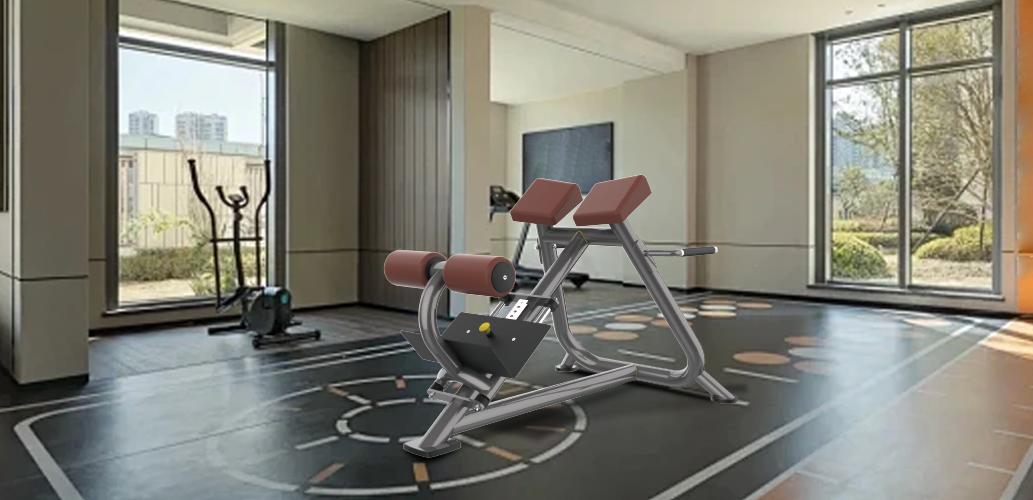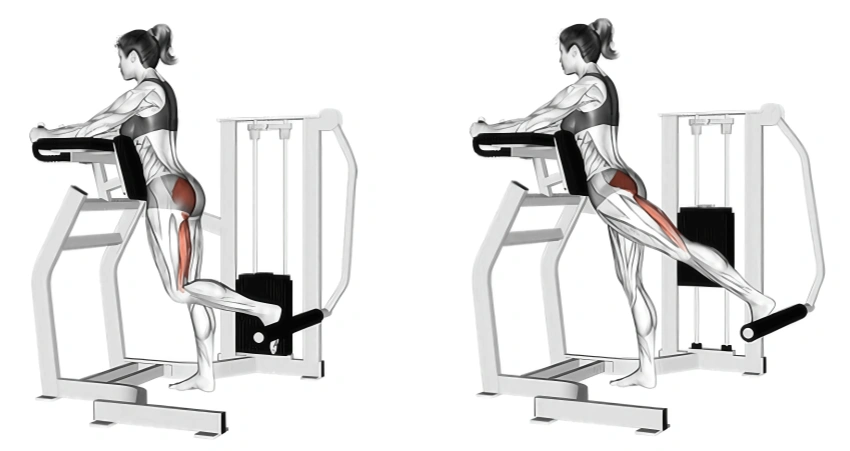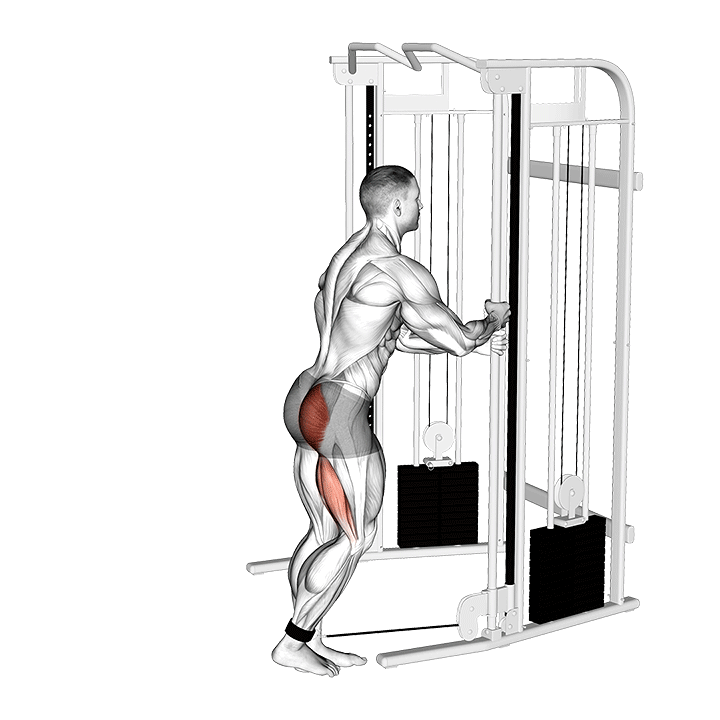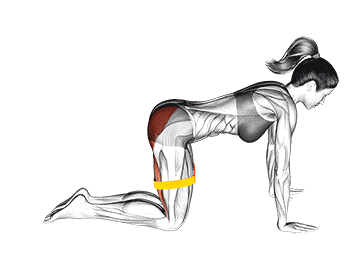
Glute extension machine. You’ve probably used it, or at least watched someone doing those slow, awkward kickbacks. It looks simple — just move your leg and boom, glutes.
But is it actually helping?
Or are you just going through the motions?
Then there’s the glute hyperextension machine — that other one across the gym where people bend forward and lift back up like a superhero coming out of the floor.
Looks weird. Feels intense.
One isolates your glutes with minimal effort. The other trains your whole backside with real movement.
Both say “glute” in the name — but they couldn’t be more different.
Let’s break it down — what each one does, who should use them, and which one’s actually worth your time.
The glute extension machine is the one where you kick your leg back — usually one side at a time.
You’ll see a cable version or a pad you press with your foot. Either way, it’s made to hit your glutes without putting stress on your back.
You can throw it in after squats or hip thrusts to crank up the burn — just don’t expect it to build serious glute strength on its own. It’s extra, not essential.

🎯 What it trains
Mostly your glute max — the big muscle that gives your butt shape.
You’re isolating it, without much help from your legs or core.
🏋️ How to do it
The glute hyperextension machine is the one where you lean forward over a pad and lift your upper body back up.
It looks like a back exercise — and it is — but it hits your glutes hard too, especially when you tweak the angle and squeeze at the top.
It’s more of a full-chain movement, working not just your butt, but everything behind you. Great for building strength, not just a pump.

🎯 What it trains
Your glutes, hamstrings, and lower back — all firing together.
It’s not isolated like the extension machine. It’s a full backside lift.
🏋️ How to do it
Both machines train your glutes — but not in the same way.
One is about isolating a single muscle. The other works your whole backside through a big, full-body movement.
Here’s how they compare:
| Feature | Glute Extension Machine | Glute Hyperextension Machine |
|---|---|---|
| Movement type | Leg kicks back | Torso lifts up (hip hinge) |
| Main muscles | Glute max (isolated) | Glutes, hamstrings, lower back |
| Effort level | Low to moderate | Moderate to high |
| Core involvement | Minimal | Active bracing required |
| Good for | Burnouts, beginners, sculpting | Strength, posture, posterior chain power |
| Limitations | Can feel too “easy” or repetitive | Harder to learn, needs control |
So while both say “glute” in the name, they do very different things.
You’re not choosing between better or worse — you’re choosing between focused isolation and full-chain strength.
Not really. These machines do totally different things.
The glute extension machine isolates one muscle.
The hyperextension machine works your whole backside.
That’s not better or worse — just different.
🔹 Glute extension is great…
…when you want a clean, simple glute squeeze without worrying about form.
It’s easy to use, easy to feel. Perfect as a finisher or a warm-up.
But it won’t build strength. It won’t carry over to big lifts. You’ll feel it — but you won’t get far relying on just that.
🔹 Glute hyperextension is better…
…when you care about strength, stability, and overall movement.
It teaches you to hinge, to brace, to use your glutes like they’re supposed to work — in real life and real lifts.
More muscles, more payoff. But also, yeah — more effort.
You don’t have to pick one forever.
But knowing what each machine actually does? That lets you use them better.
And if you don’t have access to either — no stress.
There are solid alternatives that hit just as hard.
No glute extension machine? No problem.
You can still isolate your glutes — and honestly, some of these hit harder.
You just need control, intention, and a little patience.
🔹 Cable Kickbacks

Basically the same movement, just standing.
Strap your ankle, hinge slightly, and kick straight back.
Control the range. Squeeze hard at the top. Don’t swing — own it.
🔹 Donkey Kicks (Bodyweight or Banded)

Old-school for a reason.
Hands and knees on the floor, kick one leg up and back.
Add a mini band if bodyweight feels too easy. Small move, big burn.
🔹 Single-Leg Glute Bridge

Minimal setup, max tension.
Lie down, raise one leg, and drive your hips up through the grounded heel.
Keep your hips level — and your ego in check. This one humbles people.
You don’t need a machine to train your glutes right.
You just need something that forces them to show up — and stay working.
Glute machines aren’t all created equal.
The glute extension machine gives you a solid burn — simple, isolated, no stress on your spine.
The glute hyperextension machine takes more effort, but pays off in full-body strength.
One isn’t better. They just do different jobs.
Use the extension machine when you want control.
Use hyperextensions when you want power.
Or skip both and use free-weight alternatives that actually make your glutes work.
Point is: don’t rely on any one machine to build your glutes.
Rely on consistency, smart movement, and knowing what each tool’s really for.
That’s how you train glutes that do more than just look good.
I’m Jessica Camp, a passionate fitness enthusiast and the creative force behind Inpek Fitness’s content. With over a decade in the fitness industry, I combine my expertise in exercise science with a deep knowledge of commercial gym equipment. I’m dedicated to promoting health and wellness by sharing valuable tips, training techniques, and the latest trends in Pin Loaded Machines, Plate Loaded Machines, Multi Function Gym Machines, Gym Multi, and Free Weights. Whether you’re a gym owner or a fitness enthusiast, my articles are crafted to inspire and empower you to reach your fitness goals. When I’m not writing, I love working out and exploring innovative fitness solutions.
Looking to enhance your gym with premium equipment? Have inquiries or ideas? Complete the form below to engage with our expert team. We’ll work with you to realize your fitness facility goals efficiently and effectively.